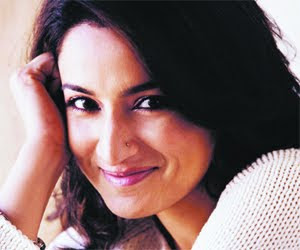
Actor Tisca Chopra gets talking about her new role as a judge in Star Anchor Hunt
You will be seen on the small screen as a judge for the first time in Star Anchor Hunt. How does it feel to be back on television?
I can’t wait for the Star Anchor Hunt to start. We travelled to many small towns scouting for talent. The contestants were so ambitious and have such a will to make it! After pack-up, we would go for sightseeing. It was a mini-Bharat -darshan.
The overall scene on the small screen has changed since your last stint on television. How do you perceive this change?
I can’t relate to the content in soaps on TV. I love Indian Idol, Comedy Circus and most of the dance shows. But reality TV today is shocking. People will say anything to be on television.
What prompted you to be a judge on Star Anchor Hunt?
I was between films and Star Anchor Hunt gave me an opportunity to travel the country, meet the youth and see what makes them tick. As an actor, it’s great to be deeply connected to real people from different cities and small towns all over India and to hear their stories. TV is a great medium to reach the vast population of this country. Its popularity is huge, beyond our imagination.
We have heard that you have also been a news anchor. Is it true?
No, I haven’t been a news anchor, but I am trying to convince the channel to send me on a special assignment to Afghanistan or if they need an interview with United States President Barack Obama. Now that would be fun!
What qualities will you be looking at in a contestant to be a good anchor?
They should have an ability to respond to rapidly- changing scenarios or be quick enough to think on their feet. They should also have a keen insight into world affairs and a decent appearance.
How will the anchors selected by Star Anchor Hunt be different from their competitors?
They will be different from their contemporaries because the process is different. This is the first time you’ll see anchors selected for the job, not just people who landed up reading the news. These will be anchors who have had rigorous training and they are not just anchors but also journalists. There isn’t a single anchor hunt across news channels. Star Anchor Hunt is a pioneer. And this would be a treat for those looking to see some real talent emerge out of the newsroom.
Can you recall any funny incident that occured during the auditions?
An over-confident contestant challenged the channel and our judgement. The comments had to be heard to be believed. We laughed so much that the shooting had to be stalled. If Star News shows all the footage, the show will have the highest TRPs ever!
Journalist Deepak Chaurasia is known for his serious image. But in this show, people can see him in a completely different light. You will see him fall off his chair laughing.
Apart from the concept, how will Star Anchor Hunt be different from other reality shows?
you have Chetan Bhagat, Deepak Chaurasia and me as judges. Also the two winners will get actual jobs with the channel and start a new career. This is on the lines of The Apprentice. I hope the winners will be the new face of Indian news.
Are you keen on participating or anchoring any reality shows?
If they get Meryl Streep, Leonardo Di Caprio and Johnny Depp, as house-mates on Big Boss, I will definitely be a part of the show! As for compering, I’d love to do a Koffee With Karan, host a chat show or do an Indian Idol.
You were last seen on the big screen in Firaaq. Why is there such a long gap between the movies?
The tragedy of an actor’s life is that they have no control over the film after their work is over. If I had my way, I’d release them the Friday after shooting got over. I have finished three films back- to-back between 2009 and now, but you’ll have to ask the producers when they will come out.
What are your forthcoming films?
Rangeen is my first comedy and an adaptation of A Midsummer Night’s Dream. I have a lovely role in it. 404 is a psychological thriller that also deals with bi-polar disorder. I play a professor who is also a psychiatrist. Khushiyaan is a Punjabi film set in New York and Punjab. I play an NRI who returns to India to discover love and her family. I also have a guest appearance in Vinay Shukla’s Mirch that takes a satirical look at relationships between men and woman.
You were also writing a script. How far has that progressed?
It hasn’t progressed at all. Every time I sit down to write, a shoot comes up and I trot off. Coming back and restarting is hard. But I’ll finish it soon. Basically writing is like a husband, whom you take for granted. Acting’s like a lover, I wait for it and chase it. (Smiles).
You have worked in theatre, films and television. What has been your favourite medium?
Films are like miniature paintings. I love the detailed work that one can do in movies like changing your physical appearance or the voice to suit the character.
Television is like big strokes of whitewash. A giant monster waits for four episodes each week; it has to be fed, at the cost of quality sometimes.
Theatre is just a necessity for actors. It helps an artiste chisel his craft in an exacting manner with immediate results. You know right away if you have connected with the audience or not.
